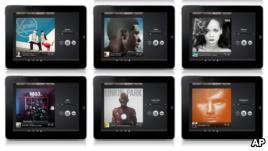
People can listen to music on many devices, including tablets(平板电脑) and mobile phones. As music becomes digital, billions of people around the world can listen to many different kinds of songs no matter where they live— the variety and quantity of music is greater than ever before, and available to more people.
These changes are both good news and bad news for the music industry. They help spread music around the world. But digitizing music can create problems for songwriters, musicians and singers.
Recently, the music industry observed World Intellectual Property Day. Intellectual property includes books, songs, art, business methods and other works that humans have created from their intellect.
Jimmie Moore is a singer, songwriter and poet from Houston, Texas. He calls himself "JMetro." He says intellectual property laws protect his music. Jmetro says he likes the opportunities new technologies give him and other artists. But he says those technologies can also hurt artists.
Michelle Woods directs the copyright division of the World Intellectual Property Organization. She says international copyright law agreements have been changed to deal with the digitization of music. She says singers and musicians should be able to earn money when their digitized songs and music are played.
Even though many songs can be downloaded without payment, the number of digitized songs that are being paid for is increasing. The music industry says sales overall grew almost 7 percent to $6.85 billion last year. About half of those sales came from digitized songs, and the other half from music sold in stores.
Experts believe musical creativity will increase because of the Internet, but only if the artists are paid for their work. They say if musicians are not rewarded for their work, everyone will suffer.
本时文内容由奇速英语国际教育研究院原创编写,禁止复制和任何商业用途,版权所有,侵权必究!
1.Where can’t you listen to music?
A tablets
B mobile phones
C TV sets
D air-conditioners
解析:选D。D。推理判断题。第一段说人们可以在各种地方听到音乐。四个选项中,D选项air-conditioner空调是不可能用来听音乐的。
2.The underlined word “observed” in paragraph 3 means_________.
A discover
B celebrate
C watch
D obey
解析:选B。B。词义猜测题。根据本句,音乐界最近应该是”庆祝”世界知识产权日。所以这里应是“庆祝”之意(B选项)
3.From what Jimmie Moore said, we know the bad thing for music industry is that__________.
A technology helps music spread
B intellectual property protects his music
C technology hurts musicians
D people listen to music everywhere
解析:选C。C。推理判断题。人们听音乐的渠道多是好事, 但Jimmie Moore明确指出,这种情况可能会伤害音乐家们(指知识产权得不到保护)。
4.According to Michelle Woods, what will happen to the digitization of music?
A It will be paid to be listened to.
B It can only be listened to by permission.
C The copyright law will agree it to be listened to.
D The music will change the law.
解析:选A。A。推理判断题。知识产权将使音乐家们的创作得到保护,即听他们音乐的人将付费。
5.Which of the following statements is true according to the last part of the passage?
A The number of paid digitized songs is decreasing.
B The sales of digitized songs last year were about $3.43 billion.
C More music experts will appear on the Internet.
D Because of the Internet, more musicians are not rewarded.
解析:选B。B。细节理解题。文章倒数第二段,去年音乐产业收入达68.5亿美元,而其中大约一半来自于网络收入,所以B是正确选项。A选项说数字化的音乐数量在减少,这与事实刚好相反。C选项说更多的音乐专家将出现在网络上,文章没有提到过此事。D选项说因为网络的出现,更多的音乐家得不到报酬,本文重点关心的是如何确保音乐家得到他们该得的报酬。